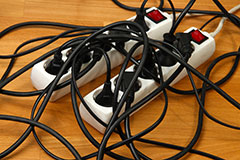Trees and Power Lines
Trees that touch a power line are referred to as "danger trees." They can sometimes act as a conduit to ground for electricity from a power line. If you notice that a tree is in contact with a power line:
- Contact NTPC immediately
- Keep away 10 meters (30 feet) from the wire and anything else that touches it
- Warn others who may pass by until NTPC crew members arrive
Call NTPC: 1-800-661-0854
Windy conditions and stormy weather
Trees or branches can tug on power lines during windstorms. A branch that breaks in a storm and falls into a power line can bring it down. The line may still be conducting electricity. If you see a power line on the ground stay away from it and call NTPC as soon as possible.
- Inspect your trees regularly for signs of dead or dying branches
- Watch for trees and branches that could grow into, fall on, or fly into power lines
- If you are planting a tree, choose one that will not grow into the power line. Better yet, don't plant near a power line at all
- Pruning or working in trees that are near power lines can be dangerous. NTPC can help you contact someone with the right tools and experience to remove the unwanted branches or tree
Keep safe at home
 Accidents can happen at home when you least expect them. Whether you are building, renovating, buying or just living in your home, it is always a good idea to go over these safety tips.
Accidents can happen at home when you least expect them. Whether you are building, renovating, buying or just living in your home, it is always a good idea to go over these safety tips.
Give the job to an Electrician
- For any wiring project, give the job to a professional. If you do end up tackling your own electrical wiring projects, protect yourself, and get the proper safety information and training
- Have your completed project approved by an electrical inspector or certified electrical journeyman. Their know-how will help prevent possible future problems
Watch your cords!
- Keep it dry. When removing a plug, make sure your hands aren't wet or touching a metal object. Our bodies act as conductors and the combination of wet hands on an appliance could render a fatal shock
- Pull the plug. Not the cord. Disconnect your appliance properly. You will be protecting yourself and increasing the life of your cord by not stressing the connection.
- If damaged, don't use it. If a plug or cord looks damaged, get it professionally repaired before plugging it in again
- Protect your cords. Keep all electric cords away from heat and water. Don't put your cords near doorways or under carpets where people will step on them.
- Use a properly rated surge protector or Uninterruptable Power Supply (UPS) to protect your electronic equipment
- Do not overload a power bar
- Use the proper extension cord. Extension cords have special ratings; make sure you use the right one for your load
Safe use of Appliances
- Make sure your electrical appliances have the Canadian Standards Association (CSA) stamp of approval
- Unplug your toaster before you try to retrieve your toast
- Keep all your appliances and tools well away from water!
Outdoor safety
- Wait for dry weather before you use your electric lawnmower
- Use ground fault circuit interrupters on all outdoor plugs
- Ensure your outdoor appliances are kept away from water or wet surfaces
- Look up! If you're using a tall ladder or a pole to reach a high area, check first to make sure you won't be connecting with power lines
- Look down! If you plan on digging, call NTPC and the gas company first to find out where buried cables or gas lines are
Safety with Power tools
- Unplug your power tools before adjusting or changing an attachment. When you've finished using a power tool, unplug it
- Keep your tools far away from water and wet surfaces. Keep yourself and your cords away from water and wet surfaces, too
- Never touch a grounded object like a water faucet when you are using a power tool
- Keep the vents on your power tools clean of debris to avoid overheating

